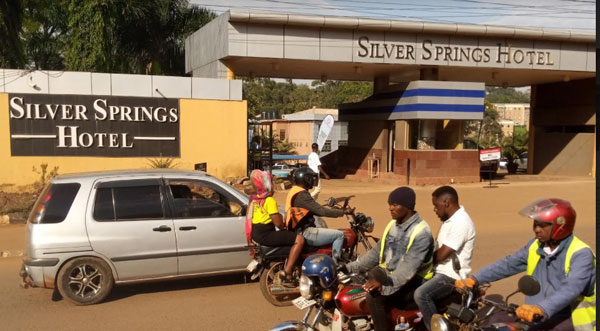
COMMENT | Alfred Geresom Musamali | I once ate on credit an over five million shillings’ (US$2,000 at the time) working lunch at the Silver Springs Hotel in Bugolobi, a Kampala, Uganda suburb. I then spent three months of my subsequent salaries, repaying for the meal!
I had had a stint as a public servant soon after graduating from university in 1986 but had left it in favour of journalism. After ten years in the newsroom, I was returning to the public service and learning anew how to pull its ropes. Only then did I realise that public procurement laws and regulations developed ever since I was last in the public service can be twisted around on many occasions, but that if you are only once suspected or actually caught twisting them in order to eat a buffet or purchase fewer goats or divert some iron sheets (see photo) or anything else like some political leaders are suspected to have done recently, you will never joke around with them again.
My bureaucratic public service employers were hosting a workshop for ten or so local government officials (among them three young, cute ladies) from upcountry and had, in accordance with the Public Procurement and Disposal of Assets (PPDA) Act (2003) appointed me as contract manager for the Editing, Documentation and Advocacy (EDA) activity. It fell under my EDA docket and I had accordingly included it in the Work Plan for that Financial Year (FY), had had it approved in the Procurement Plan for the FY and had budgeted for it in such a way that I had a balance to cater for unforeseen circumstances. So, I naturally assumed that I was a real manager with textbook definition powers to plan, organise, coordinate and monitor its implementation. I assumed, too, that I had the mandate to make emergency decisions as and when they arose.
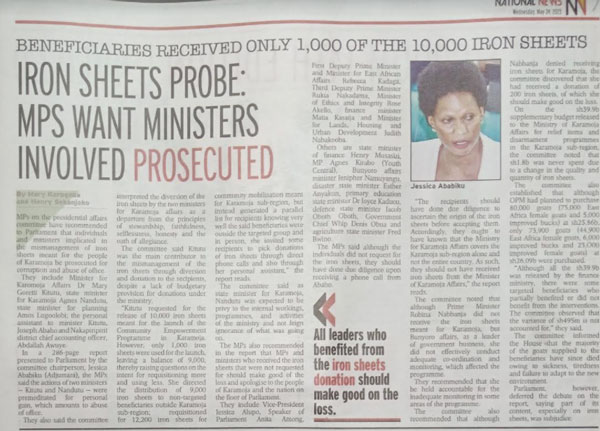
Silver Springs Hotel, an already pre-qualified bidder for the provision of my employer’s conferencing and catering services, had been sent a Request for Quotation (RfQ) and, upon submitting their quotation, had emerged as the Best Evaluated Bidder for provision of the services whose contract I was to manage. I had, therefore, drafted the letters of invitation to the officials, had them signed by the Executive Director (ED) Ben Paul Mungyereza, dispatched them by courier, made follow up phone calls to confirm that the invited officials had received the invitation and would be coming then waited at the hotel on a Tuesday morning for them to arrive.
Those who have known me since 1977 may have observed that when I achieve academic excellence, career advancement, greater family responsibility, power, money or some other indicator of success, I lift the collar of my shirt towards my ears then walk with a limp and spring. I copied the habit from Mr (Johnson or something) Ochar, who briefly taught me Senior 3 English Language and Literature in Manjasi High School during that year. Freshly graduated from Makerere University, Mr Ochar – whom I have never seen or heard about again since he fled into Kenya to escape General Idi Amin’s economic war – used to walk dragging his left leg behind, acting as if his right leg was slightly shorter, nodding his head and showing off with some other youthful malala (mannerisms). That is the limp and spring I had modified over time and excellently exhibited at Silver Springs as I received my guests, directed them to Mutungo Hall where the workshop was to take place, and availed them a programme for the activities.
According to the programme, there was to be registration of participants as well as an official opening ceremony by Ben Paul and other senior officials before the morning tea break that Tuesday. Ben Paul and the senior officials would leave soon after the tea, confident that the actual work was proceeding well. We would work one session between the morning tea and lunch, then another session between lunch and an afternoon tea. After the tea, I would attend to the workshop team’s administrative issues (an expression borrowed from civil society organisations to mean payment of their allowances) before dispersing for the day and reporting back first thing Wednesday morning.
“No, the workshop is non-residential,” I emphasised, obviously exhibiting my malala. “During the administrative issues session, I (with emphasis, to show my importance!) am going to pay you a per diem so that you can choose on your own where to stay for the nights”. I advised that in Kitintale, just across the valley from Bugolobi on the road to Luzira Maximum Security Prisons and Port Bell, there were some accommodation facilities suitable for public servants to stay the nights, have some fun and still make enjawulo (save a coin) for bread and milk to carry back home.
“How about if I wish to spent a night in Silver Springs?” somebody asked.
“You will be absolutely most welcome to top up on your approved rates and enjoy your night in the Four Star facility,” I retorted. I unnecessarily explained – because most of them had attended many other workshops there in the past, anyway – that the place has an Olympic size swimming pool, an automated shoe polishing machine, a full range of sauna and massage facilities as well as very ambient beer gardens. I still do not know whether the hotel is rated Four Stars, by-the-way. Neither am I even sure what constitutes a full range of sauna and massage facilities. I just wanted to appear all knowing, especially in front of the young ladies.
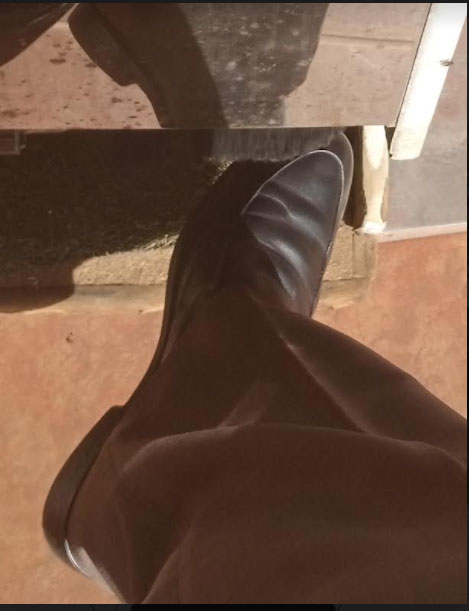
“How about supper and breakfast?” asked the same person, again. He was joking, of course, because he knew very well that a per diem in the Ugandan public service caters for the officers’ accommodation, meals n’ebiggenderako (read as beer and other services not necessary to mention here!). If I was in addition serving them some meals at all, it was because the nature of the activity did not make it convenient for me to release them every few hours to go sniffing around for funny t’oninyira mubyange (do not step into my) food joints in the name of making enjawulo then coming back too late, full of sweat or disorganised in other ways to work.
I announced that, as reflected in the programme, we would work through Wednesday and Thursday and were expected to have the inputs ready on Friday morning when we would make presentations, hand them in, take a morning tea and travel back to our stations.
“How about transport refund?” asked another officer.
“Of course,” I said, obviously with my limp and spring, “I (again with emphasis!) would pay the refund as and when the officers handed in their inputs”. The money had actually been remitted on my salary bank account where it was sitting idly for me to admire whenever I accessed my bank statement – possibly every morning, afternoon and evening – as my own money was so meagre that it never spent more than a few hours on the account.
“And if we do not submit the work?”
I felt the self-importance here. They were a jolly team of mainly twenty or more years younger than myself and they were just bound to pull my leg here and there. They were even scientists of sorts and I was, well, some public relations functionary whom they felt did not fully understand what I was supervising. But I was at no time going to let my powers be brought into doubt among them. I had to reaffirm the powers over and over again. So, I said, making sure the ladies took note of my powers, “I will not pay any refund to anybody who does not submit their final work”.
One lady said, “But, Sir…”. I cut her short.
“I prefer being addressed as Jajja (Grandpa) rather than Sir,” I guided, jokingly.
“Okay Jajja,” she said, giggling but with obvious disdain in her voice. “I am sick. Can I just be paid my transport and I go back to my station?”
I indicated that there was no room for negotiation on such small issues. I was just administering the usual arrangements really and the chaps knew it.

I had Under-estimated the workload
It turned out I had underestimated the workload. Most of the officers turned up punctually every morning, patriotically put in their very best, but the inputs were not flowing according to plan. I pleaded with them to spare about an hour after evening tea (technically beyond public service working hours) so that they make more input – and the little angels very gladly did. Still, we were not beating benchmark deadlines – so much so, in fact, that by morning tea break time on Friday we had not finished, could not make presentations and, obviously, could not hand in the final inputs. Limping and springing around, as usually, I pleaded with them to extend past tea time.
“Will you give us lunch?” yet another asked.
“Yes, I will,” I assured them, without thinking much about the implications.
They cheered, called me a good old Jajja and kept on working. By two o’clock we had worked very hard but were still just getting ready the PowerPoint slides for the presentation. Lunch had not been budgeted for, though, had not been approved and had, therefore, not been secured. However, that was the least of my worries. What was I contract manager for, I reasoned, if I could not make any emergency decisions? I casually went to see the Hotel Management over the possibility of including an extra meal on our bill.
“That is not possible, Jajja, unless you get approval from your procurement unit,” said the Hotel Management, in what appeared to be a slight Kenyan accent. Most management gurus in Uganda’s hotels are either Kenyan or Kenyan trained and this one had to be among them. He had only heard the others call me Jajja and was following suit – probably without even knowing what the title meant.
“But do you have the food?” I asked.
“How do you even doubt that? We are one of the biggest and longest established hotels in Uganda. We were established in the 1960s and have changed neither name nor location nor reputation. So, how can we fail to serve just an extra ten or so meals?” said he.
I rang my employer’s procurement unit back at city centre, about six kilometres away. Guy called Arthur Burungi came online. “Bureaucrat,” I shouted into the phone. That is the title I gave everybody in my employer’s office and, in turn, that is the title by which they also used when they were not calling me Jajja.
“Yes, Bureaucrat,” answered Arthur. “I need to adjust a procurement. My officers are working till late and I need to give them one more lunch,” I explained.
“Go ahead,” said Birungi, in a Kinyankole accent. “After all, they are (with emphasis) your officers. What concern of mine is it if you wish to give them a feast from your pocket? Today is a Friday and if you wish you can offer them plenty of alcohol to accompany the bunquet complete”.
“Not from my pocket, nawe Bureaucrat,” I explained. “I, instead, wish to alter the details of the procurement”.
“Do not waste time. That is not possible,” Arthur, who now works for the PPDA Authority, dismissively advised. He was a tall and bulky man who had started his procurement career at the United States Agency for International Development (USAID) from where he must have learnt how best to emotionlessly quote the regulations. I considered him hopeless and went ahead to ring his seniors. Those were not even available on phone – which was understandable because it was lunch time. Neither were my direct supervisors.
Failing that, I took a unilateral decision, going back to the Hotel Management and committing myself in writing to sort out the matters later provided my very hardworking chaps had one more lunch. Hotel Management gave me enough food coupons to cover everybody and we proceeded to the Voyager Restaurant in the hotel as the officers again cheered me. By about three o’clock we had finished the work so I rushed to the Bugolobi branch of my bank to draw their money (and leave my account empty!), convened an official closing ceremony, refunded their transport costs and wished them Bon Voyagè.
Eating was Easy – but not so the Paying
Come Monday morning, Silver Springs Hotel was punctually at Arthur’s desk on Floor 1 of the Bureau’s tower, presenting the claims. Arthur compared with the proforma invoices, and advised that the figures were not tallying. Go to the Bureaucrat to synchronise with you then come back.
“Who is the Bureaucrat?”
“Musamali. The one you call Jajja”.
They came to me on Floor 8 and I had to get back down to Floor 1 with them, obviously limping and bouncing better than Mr Ochar had ever achieved. I had deadlines to beat and this Arthur guy was just playing around. But Arthur advised that we separate the authorised bills from the extras – which I asked the Hotel Management to go back and do. When they brought back the bills, Arthur only picked the one with the authorised figure then arrogantly asked me to settle the extras from my pocket. But I was going to have none of this Arthur’s nonsense. I went to his supervisors and explained that I still had balances on my EDA quarterly allocation which could cover that. One supervisor looked at me very sympathetically then said, “That is not how Government works”. I got furious, felt like tearing a few papers in front of the Bureaucrats, felt also like hauling a truckload of insults at them for being hell bent on sabotaging government programmes, but the stone-faced guys just sat back at the desks, remained silent, watched me step by step surely losing my limp and spring. My next appeal was to higher authorities, up to Ben Paul. But they were all not in position to help. The law, one of them said, had provision for retrospective procurement under emergency situations but sumptuous (Mr Ochar taught me that word, too!) donations of buffet at a top city hotel could hardly qualify for that.
How about if I raised a new procurement but paid for the meal without feeding it to anybody? That was not possible either because it had not been provided for in the annual procurement plan. Besides, I would need to forge attendance, output, per diem, transport refund and other accountability records of the officers I allegedly fed. That criminality, they pointed out, carries many more years behind bars.
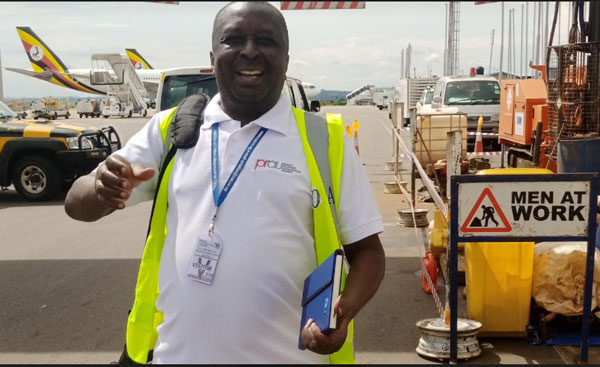
Hide and Seek Game with Silver Springs
The subsequent hide and seek game between Silver Springs and myself was worth an entry into the Guinness Book of Records. My monthly salary was much less than the over five million shillings demanded by the hotel so I could not settle the lunch bill in one go. Besides, I had a running bank loan which was swallowing half of that salary so even if I was willing to part with all the balance I would still not meet the bill in less than three months. Forget, too, that I had other household obligations that could not wait. But I was conscious of a long established government regulation that barred public servants from causing financial embarrassment to themselves and to their employer, the penalty for which was dismissal. I started fearing any knock at my office door, started equally fearing any unknown face that could bump into me along the city streets lest they were debt collectors. I could hardly envision myself being driven past Bugolobi to the debtors’ section in Luzira on a Friday afternoon, never to be bailed out till Monday – assuming that I had any substantial person who could bail me out, incidentally. By the Grace of God, though, I did finish repayment in three monthly installments. But to date Arthur, who stays around Seeta in my Mukono Municipality neighbourhoods, has never stopped laughing about how eating on credit a five million shillings’ buffet temporarily cured my limping, springing and other malala
*******
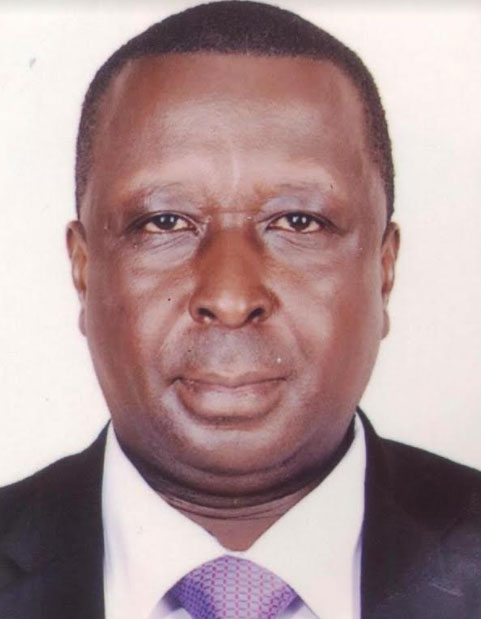
The author is Founding Director of Vicnam International Communications Ltd, a private firm of communications, public relations and information management consultants. He specialises in the Proofreading and General Editing (PAGE) of documents and can be contacted by Tel: (+256)752-649519 and by Email: agmusamali@hotmail.com.
 The Independent Uganda: You get the Truth we Pay the Price
The Independent Uganda: You get the Truth we Pay the Price




A very educative experience, I gleaned a lot of lessons and the biggest is that Jajja needed something silver, like a silver spoon at birth, to sort the buffet aftermath in the Silver hotel.
Soo interesting of how jajjas Malala was calmed